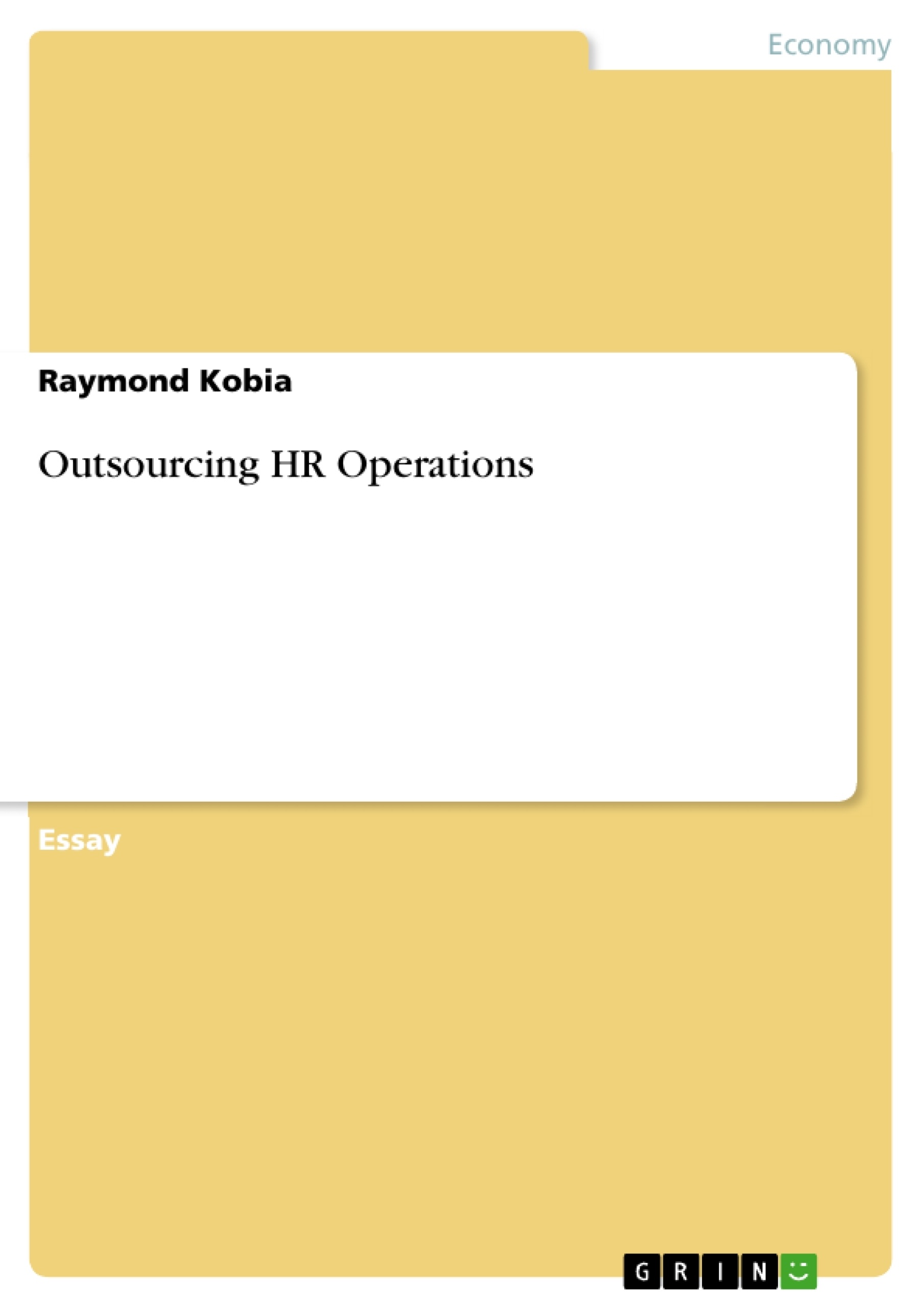The Human Resources (HR) department plays a critical role in organizations by managing the human capital, which is the backbone of any successful business. HR manages various administrative activities, including financial, performance appraisal, personnel management, professional growth, and hiring. Such tasks require a significant amount of time, effort, and resources, which can distract from the organization's primary mission. Outsourcing HR activities to third-party service providers could reduce waste, limit disruptions, and keep the company's mission at the forefront.
It is common in many industries, and HR is no exception. Outsourcing HR operations can benefit organizations through cost savings, access to specialized expertise, and improved efficiency. However, outsourcing also has disadvantages, such as losing control over HR operations and creating potential conflicts with the organization's culture and values. This study critically examines the notion that HR operations should be delegated to the greatest extent possible to foster waste elimination, reduce distractions, and keep the company's objective in focus. It further examines the operational role of HR, the benefits and drawbacks of outsourcing HR, and how outsourcing HR influences waste disposal and inefficiencies.
Inhaltsverzeichnis (Table of Contents)
- Introduction
- HR as an Operational Function
- Outsourcing HR
- Theoretical Perspectives on HR Management
Zielsetzung und Themenschwerpunkte (Objectives and Key Themes)
This study critically examines the idea of outsourcing HR operations to the greatest extent possible to reduce waste and distractions and maintain focus on the company's objectives. It further analyzes the operational role of HR, the advantages and disadvantages of outsourcing HR, and how outsourcing HR impacts waste disposal and inefficiencies.
- The evolving role of HR as an operational function within organizations.
- The benefits and drawbacks of outsourcing HR operations, including cost savings, access to specialized expertise, and potential loss of control.
- The influence of HR outsourcing on waste elimination and improving organizational efficiency.
- The impact of HR outsourcing on employee morale, organizational culture, and innovation.
- The application of various theoretical perspectives on HR management, such as contingency theory, resource-based view, and institutional theory, to understand HR outsourcing decisions.
Zusammenfassung der Kapitel (Chapter Summaries)
- Introduction: This chapter sets the context for the study by introducing the critical role of the HR department in managing human capital and the potential benefits of outsourcing HR activities. It highlights the advantages of outsourcing, including cost savings, access to specialized expertise, and improved efficiency. It also acknowledges the potential drawbacks, such as losing control over HR operations and conflicts with the organization's culture and values.
- HR as an Operational Function: This chapter explores the evolving role of HR from a support function to an operational function. It discusses the critical responsibilities of HR in implementing a corporate strategy, ensuring employee competency, and managing day-to-day activities. It emphasizes the importance of HR in ensuring compliance with labor laws and regulations, fostering inclusivity, and managing employee training and development.
- Outsourcing HR: This chapter delves into the concept of outsourcing and its prevalence in modern business. It explores the motivations for outsourcing HR, including cost reduction, access to specialized expertise, and allowing organizations to focus on their core competencies. It presents evidence suggesting that companies utilizing HR outsourcing experience greater cost savings compared to those who manage HR internally. The chapter also acknowledges the potential risks associated with outsourcing HR, such as losing control over HR functions, employee disconnect, and the erosion of internal expertise.
Schlüsselwörter (Keywords)
The study focuses on the critical aspects of human resource management, specifically examining the practice of outsourcing HR operations. Key terms and concepts include outsourcing, human resource management, cost savings, access to specialized expertise, employee morale, organizational culture, innovation, waste elimination, and theoretical perspectives on HR management.
Frequently Asked Questions
What are the main benefits of outsourcing HR operations?
The primary benefits include significant cost savings, access to specialized HR expertise, and improved organizational efficiency.
What are the potential drawbacks of HR outsourcing?
Potential risks include losing control over HR functions, conflicts with company culture, and a decrease in employee morale.
How does HR outsourcing impact waste elimination?
By delegating administrative tasks to third parties, organizations can reduce distractions and focus resources on their primary mission.
Which theoretical perspectives are applied in this study?
The study uses contingency theory, the resource-based view, and institutional theory to analyze outsourcing decisions.
Has HR's role changed in modern organizations?
Yes, HR has evolved from a simple support function to a critical operational function involved in corporate strategy and compliance.
- Citation du texte
- Raymond Kobia (Auteur), 2023, Outsourcing HR Operations, Munich, GRIN Verlag, https://www.grin.com/document/1367244



